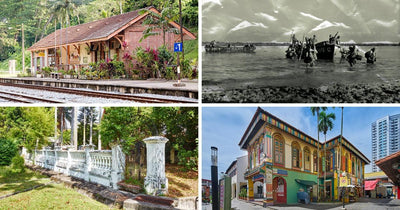Discover the rich history behind heritage businesses in Katong-Joo Chiat, each with their own story of resilience, innovation and intergenerational piety.
Street Corner Heritage Galleries: Katong-Joo Chiat
The National Heritage Board (NHB) is launching Street Corner Heritage Galleries: Katong-Joo Chiat with six participating businesses – Kway Guan Huat Joo Chiat Popiah, Joo Chiat Fei Fei Wanton Noodle House, Kim Choo Kueh Chang, Guan Hoe Soon Restaurant, Sin Heng Claypot Bak Koot Teh, and D’Bun – inviting visitors to learn more about their origins and how they have continued to thrive and grow.
Katong-Joo Chiat has become known for its charming blend of the old and the new, with its colourful pre-war shophouses and diverse communities co-existing with modern shopping malls and hip cafes. Discover the rich history behind heritage businesses in Katong-Joo Chiat, each with their own story of resilience, innovation and intergenerational piety. From lesser-known anecdotes behind classic delicacies to inspirational tales of intergenerational support and cooperation, they offer insight into the heritage businesses in this vibrant precinct.
The Street Corner Heritage Galleries scheme celebrates and documents the rich experiences of heritage businesses and aims to foster a deeper appreciation for heritage in everyday spaces. Under the scheme, NHB works closely with interested owners of heritage businesses with at least 30 years of history to co-create “mini-museums” to showcase the history and heritage of their businesses and trades, through displays of historical documents, photographs and artefacts.
Participating Businesses
Kway Guan Huat Joo Chiat Popiah

Address: 95 Joo Chiat Rd, Singapore 427389
One of Singapore’s oldest popiah and kueh pie tee makers, Kway Guan Huat Joo Chiat Popiah was founded at 95 Joo Chiat Road in 1938 by Quek Tren Wen, an immigrant from Anxi, China. Popiah consists of finely-chopped vegetables and meat encased in a thin flour skin, while kueh pie tee is made of the same filling stuffed into pie-crust shells.
Rising at dawn, Quek would commence the arduous task of kneading the day’s dough by hand. The excess dough was repurposed to make kueh pie tee shells in the early days, a suggestion from his Peranakan wife, Tan Ah Poh. Initially, Peranakan families made up Quek’s primary clientele, but word quickly spread, leading to a surge in orders from Joo Chiat residents as well as from all over Singapore.
All of their 16 children helped in the shop, with the boys trained in making the skins, while the girls, guided by Tan, learned to prepare savoury sweet popiah fillings. In the 1990s, Ker Cheng Lye, the eldest son, responded to growing demand by offering popiah fillings and sauces for sale, recognising that many customers struggled to replicate the shop’s homemade flavours.
Today, led by third-generation steward Michael, Kway Guan Huat is dedicated to preserving their cherished family tradition while also proto-typing new products such as pandan-flavoured popiah skins. Though online sales now rival walk-in customers, Kway Guan Huat remains committed to offering fresh popiah using the same time-honoured techniques pioneered by their late founder.
Kim Choo Kueh Chang

Address: 111 East Coast Rd, #109, Singapore 428801
Kim Choo Kueh Chang, a one-stop shop for all things Peranakan, has its roots in a makeshift stall marked by a banyan tree at the intersection of Joo Chiat Place and Everitt Road, which Lee Kim Choo founded in 1945. Unlike most nyonya (Peranakan women) then, Lee opened a stall to provide for her family, using culinary skills taught by her grandmother, Tok Siew Neo. Lee’s food and kindness quickly endeared her to the Joo Chiat community and attracted customers from across Singapore.
It was, however, the resounding praise for her signature kueh chang (Peranakan rice dumplings) with its generous filling that prompted Lee to focus on perfecting this iconic delicacy. In the 1970s, she moved to a shophouse at 60 Joo Chiat Place, where her handcrafted dumplings continue to be sold today.
In 1997, Lee’s daughter-in-law Helen Lim introduced bite-sized dumplings, which became popular despite Lee’s initial scepticism. Having earned the matriarch’s confidence, Lim, with her husband Wong Sin Min, took over the shop. She introduced other innovations like chicken and vegetarian dumplings filled with mock meat that helped the business overcome the swine and bird flu crises, as well as other kueh made using Tok’s recipes. As business boomed, Lim set up a shop at East Coast Road in 2003.
Today, the business is run by Lee’s grandchildren, who have expanded the shop to showcase Peranakan cuisine and culture by establishing a boutique for bespoke Peranakan wear and a mini gallery, all the while upholding their grandmother’s legacy of community spirit and commitment to quality.
Joo Chiat Fei Fei Wanton Noodle House

Address: 45 Joo Chiat Pl, Singapore 427769
Known for its handmade springy egg noodles served with fresh pork dumplings, homemade charsiew (Cantonese-style roasted pork) and special chilli sauce, Joo Chiat Fei Fei Wanton Noodle House’s story began more than 70 years ago with founder Chan Sin Yam and his humble pushcarts.
Chan, who came to Singapore aged 17 from Guangzhou, China in 1922, first honed his skills at a Jalan Besar noodle factory before relocating to Joo Chiat to sell noodles to hawkers. After the war, Chan turned to hawking, and he would ply Joo Chiat’s streets with his sons daily. Leading the way on bicycle was his grandson, Lim Loon Huat, who would announce their arrival and take customers’ orders.
In the 1970s, Chan rented a coffeeshop at 72 Joo Chiat Place, which he affectionately named Fei Fei (“fat” in Cantonese) after his two chubby grandsons. Following Chan’s passing in 2000, Lim, who had been working at Fei Fei since the age of 20, took the helm as its current third-generation owner. He decided to keep the business open round-the-clock to cater to the late-night crowd in Joo Chiat.
Over the years, Lim introduced new dishes such as their chicken cutlet noodles and yong tau foo (stuffed beancurd), and relocated to 45 Joo Chiat Place in 2023 to offer a more pleasant dining experience. Nevertheless, Fei Fei remains dedicated to making and serving noodles of the same high quality as Chan’s, thereby ensuring that his culinary legacy lives on in every bowl served.
Guan Hoe Soon Restaurant

Address: 200 Joo Chiat Rd, #01-01, Singapore 427471
Established in 1953 by Yap Chee Quee, Guan Hoe Soon Restaurant stands as one of Singapore’s oldest Peranakan eateries, where generations of families have enjoyed its signature Hokkien-Peranakan delicacies such as ayam buah keluak (chicken with keluak nuts) and hee pioh (fish maw soup).
Yap arrived in Singapore from Hainan in 1918. Though not of Peranakan heritage, he honed his culinary skills while working as a housekeeper for various Peranakan families, one of which was the Chew Joo Chiat household. Later, he opened his own coffee shop at 185 Joo Chiat Road. Word of his cooking reached other Peranakan families and they subsequently invited him and his son Kow Soon to prepare lavish Tok Panjang feasts (a long table of dishes) in their homes.
With their growing clientele, Yap opened a bigger restaurant at 214 Joo Chiat Road in 1953 to cater for occasions ranging from wedding banquets to funerals, and named the restaurant Guan Hoe Soon after his three sons. After his father’s passing, Kow Soon’s own passion for food prompted him to assume the reins of the reputable establishment, which drew notable patrons such as the late Mr Lee Kuan Yew.
The restaurant, now helmed by Kow Soon’s daughter, Jenny, relocated to 38/40 Joo Chiat Place in 2009 and later to 200 Joo Chiat Road in 2022. Having introduced her own creations like kueh salat (pandan-flavoured custard on glutinous rice), Jenny continues to lead Guan Hoe Soon in preparing authentic Peranakan cuisine from scratch and preserving the traditional taste of the food that its customers have come to know and love.
Sin Heng Claypot Bak Koot Teh

Address: 439 Joo Chiat Rd, Singapore 427652
Established in 1981, this family-owned eatery traces its beginnings to two bak kut teh (pork ribs in a peppery or herbal broth) stalls named Sin Heng Bak Koot Teh (“New Fortune” in Hokkien), which sisters Tey Chui Hua and Tey Siew Hua founded at two Bedok coffee shops. The sisters were seamstresses turned avid cooks who shared the dream of making a living from their culinary skills.
In 1983, an opportunity arose to open their own restaurant at 439 Joo Chiat Road with their elder sister Sue Hua, as well as her and Siew Hua’s respective husbands Andy Soo and Lim See Kuang. To differentiate themselves from other bak kut teh shops, Sin Heng introduced claypots to maintain the broth’s sizzling heat till the very last drop – this eventually became their signature dish.
The year 1999 brought another challenge with the Nipah virus outbreak, during which the public shied away from consuming pork, forcing Sin Heng to close for two months. Undeterred, the Teys diversified their menu, introducing new dishes such as sweet-and-sour fish and Thai-style chicken to cater to diverse palates. Today, Sin Heng continues to serve a plethora of popular zi char (cooked to order) dishes that complement their bak kut teh offerings.
Now run by the family’s second generation, Sin Heng stands tall as a cherished culinary spot in Joo Chiat, where families celebrate milestones and patrons return to savour tender ribs in a fragrant broth that has maintained its quality through the years.
D’Bun

Photo Credits: National Heritage Board (NHB)
Address: 358 Joo Chiat Rd, Singapore 427603
Founded in 1991 by Lee Mimi, D’Bun is known for its multitude of delightful confections that are especially sought after during festive periods. Motivated by a love of good food, Lee first opened a stall selling traditional snacks in the basement of Parkway Parade.
Inspired by popular cafe names beginning with “D” at the time such as “Delifrance”, Lee chose the contemporary moniker “D’Bun'' for her stall. She initially focused on mini-sized buns including their signature charsiew bao (roasted pork buns) and da bao (sliced pork buns). The overwhelming reception to these products saw D’Bun’s expansion into a full-fledged bakery at 358 Joo Chiat Road later that year. While D’Bun initially relied on a professional baker, Lee’s dedication led her to fine-tune recipes and introduce creations like intricately hand-cut, lotus-shaped lian hua tao (longevity buns).
The Nipah virus outbreak in 1999 had a significant impact on sales, as public apprehension led to a decline in pork bun consumption. This prompted Lee to diversify D’Bun’s offerings and to introduce festive treats with a twist, such as durian-filled koi-shaped confections and Chinese zodiac animal buns. This endeavour also paved the way for the introduction of seasonal mooncakes and rice dumplings made fresh daily.
Today, D’Bun has established an annual tradition of unveiling novel creations based on traditional treats, such as pistachio and cheesecake mooncakes. Together with her daughter Serena, Lee continues to innovate with handmade delicacies that infuse modern flavours and add a fresh twist to local culinary traditions.
Street Corner Heritage Galleries: Katong-Joo Chiat is an expansion of the scheme as part of NHB’s ongoing efforts under Our SG Heritage Plan 2.0 to empower more Singaporeans to get involved with the celebration of our heritage and support heritage businesses and crafts. The scheme provides curatorial support and assistance in terms of research and content development, and funding for the fabrication of showcases.
NHB will also work closely with the heritage businesses to develop programmes that complement the showcases, and provide opportunities for them to participate in key NHB events to increase awareness of their businesses and offerings. The public can look forward to programmes such as guided trails and workshops that will showcase Street Corner Heritage Galleries: Katong-Joo Chiat.




